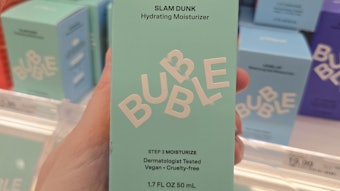
Holistic wellness is a major component of beauty from within. The divide between beauty and wellness has narrowed due in part to the overlap between topicals and supplements to address dermatological considerations and impart cosmetic effects to the skin, hair and nails. In relation, this article reviews studies linking some aspects of supplement formulations to cosmetic and dermatological conditions with a focus on natural ingredients.
In contrast to existing mass market offerings – which are often single ingredients and/or simple formulas in the form of vitamins, vitamin complexes, combinations of vitamins and minerals, collagen peptides, phytochemicals of different origin, etc. – the modern formulations described appear more complex and are not just limited to collagen, vitamins and minerals. A more prestige offer, backed by science and clinical trials, has been on the rise.
Modern formulations combine phytochemicals, sometimes in the form of standardized plant extracts, along with vitamins and minerals. These provide increased targeting and a holistic approach to the body’s inner mechanisms associated with stress, diet, metabolism, aging, etc., that eventually influence the external look of skin, hair and nails. This approach makes it possible to create formulations that, when tested, deliver real efficacy and support given claims.
Supplements are regulated as food in the U.S., so safety data and ingredient quality assurance are not required. Purity, potency, interactions, safety and efficacy should therefore be tested."
The quality of the science and clinical tests associated with ingredients and formulations brought to the market are increasingly important as well. Both consumers and regulatory authorities scrutinize the formula for efficacy based on label and non-label claims, compliance and safety.
This review will not address the use of pre-, pro- and post-biotic ingredients in the supplement industry and their association with beauty (skin and hair). However, awareness of their importance in dermatology and cosmetics is rapidly growing.
It is worth noting some safety concerns raised by dermatologists in the space. Supplements are regulated as foods by the U.S. Food and Drug Administration (FDA), not as drugs. There is thus no requirement for manufacturers to provide the FDA with safety data and ingredient quality assurance before going to market. However, the risk of an adverse event is real if supplements are not tested for safety. As such, supplements should be evaluated for purity, potency, interactions with other ingredients or drugs, efficacy and safety.1-3 Clinical studies should then evaluate safety as well as efficacy, especially in complex formulations where dosage and ingredient synergy could pose a health risk.
Skin Supplements
Several reviews, described next, have analyzed publications focused on the use of supplements for skin care with claims ranging from hydration and photoprotection to anti-aging. The supplements described are often single ingredient combinations (often vitamins, minerals or collagens) and/or may include phytochemicals. The adoption of phytochemicals such as natural extracts – in some cases, standardized for specific actives – has been a recent development in the market for beauty supplements. Today, most of the mass market space for beauty supplements is occupied by vitamins, e.g., vitamins A, C and E, biotin and niacinamide; minerals including zinc and selenium; and collagen in the form of peptides or hydrolysates.
Hydration and anti-aging claims — collagen: More than 20 clinical studies have been conducted involving the supplementation of collagen either intact, as a hydrolysate or as peptides, with claims around skin hydration, elasticity improvement and wrinkle reduction. These studies were often compared with a placebo.
More than one thousand participants between 20 and 70 years old were involved in these studies. Some found the ingestion of collagen for 90 days was sufficient to see results. The evidence obtained from these reviews suggests that oral administration of intact or hydrolyzed collagen improves skin health. Most of the studies report the beneficial effects of collagen supplementation.4, 5
A recent study tested the effects of a drinkable blend of 2.5 g of collagen peptides, acerola fruit extract, vitamin C, zinc, biotin and a vitamin E complex in 72 healthy women ages 35 years or older wherein half received the placebo. The treatment lasted for twelve weeks. Skin hydration, elasticity, wrinkles and density were evaluated and all improved significantly against the placebo. Interestingly, the improvements were maintained for four additional weeks beyond the last treatment.6
Although studies have demonstrated that collagen supplementation can enhance skin qualities such as elasticity, hydration and anti-aging, one recent study observed that dermatologic claims in the media exaggerate any evidence currently supported by the literature.7 It is therefore necessary to control the validity of social media communication when promoting the benefits of collagen supplementation.
Protection from photoaging – antioxidants: Milk fermented with lactic acid bacteria has been shown to improve DNA repair mechanisms and stimulate skin immunity after UVB damage. A formulation containing fermented milk (with lactic acid bacteria), collagen hydrolysates and sphingomyelin increased the minimal erythema dose (MED) in human subjects with moderate sunburn or redness and tanned skin after exposure to UV solar radiation.8
Supplements containing antioxidants such as rosmarinic acid, polypodium, carotenoids, Pinus bark extract, pomegranate extract and tranexamic acid can help support skin health by providing protection against oxidative stress, improving skin firmness, reducing wrinkles and decreasing the pigmentary intensity of melasma, among others.9 One clinical trial has shown that carotenoids such as lycopene, when ingested in a supplement, not only provide anti-aging benefits, but also localize in the skin, suggesting a skin-direct protective effect by these compounds.10
In other work, orthosilic acid (monomeric) has been used to replace silicon in the human body since it has better bioavailability as a supplement. Silicon supplementation has been correlated with anti-aging benefits, including an increase in the synthesis of collagen and elastin as well as an overall reduction of UV-induced skin aging.9
In general, evidence from animal models and clinical trials suggests that various food-derived components attenuate the development and symptoms of skin photoaging. The major mechanisms of these dietary components include maintaining skin moisture and extracellular matrix content, regulating specific signaling pathways involved in the synthesis and degradation of the extracellular matrix, and imparting antioxidant capacity. Taken together, the ingestion of food-derived functional components is correlated with the reduction of skin photoaging damage.11
In patients affected by facial photoaging, treatment with a supplement containing a mix of antioxidants such as pine bark extract, collagen, coenzyme Q10, low molecular weight hyaluronic acid, chondroitin sulfate and glucosamine significantly improved photoaging and skin hydration – as well as sebum and skin firmness – up to two weeks after the end of a four-week treatment period. These findings were associated with an increase in serum fibronectin and hyaluronic acid and a decrease in serum carbonylated proteins and neutrophil elastase-2 in the active treatment group, compared with the placebo.12
Hair Supplements: Single Ingredients
There has also been a recent push for supplements targeting hair conditions. In the past, vitamins such as biotin have been proposed as a drug-free approach for hair conditions. The lack of clinical evidence associated with the use of these vitamins has opened the field for novel research and formulations.13-15
Vitamins and minerals: Most vitamins and minerals, used alone or in combinations, showed little if any efficacy in clinical trials. Vitamins A and D, biotin, niacin and selenium had no clinical evidence supporting their use as an oral supplement alone, while vitamins C and E, iron and zinc were supported with weak or mild evidence. It is possible that the size of the trials was not robust enough or that the vitamins and minerals, when used alone, could not target all the potential root causes in the different individuals evaluated.
As the wellness and holistic beauty trend continues, supplements are set to take center stage in the coming years."
Botanicals: The same has been observed for botanicals such as ashwagandha, curcumin and capsaicin used alone, although they could help to support a healthy stress and inflammatory response. Conversely, pumpkin seed oil and saw palmetto showed interesting evidence as complementary or drug free support for androgenetic alopecia.13, 14
Other botanicals have shown some promise. The apple fruits of cv Annurca (AFA), native to Southern Italy, have the highest content of oligomeric procyanidins, precisely procyanidin B2. When tested as a supplement for hair growth in healthy subjects, a significant result was observed after two months for increased hair growth, density and keratin content.16 Also, in a small study, the daily intake of 100 mg of a pea sprout extract for eight weeks significantly reduced hair shedding after 28 days of treatment.17
Hair Supplements: Ingredient Combinations
Hair loss is multifactorial and associated with poor diet and nutrition as well as the natural aging process; other external factors including pollution, hair products and styling, and UV exposure all cause free radical formation, oxidative stress and microinflammation of the hair follicles. It is therefore not surprising that to address multiple root causes, a formulation containing multiple ingredients targeting different mechanisms associated with healthy hair growth would be more successful.
Using supplements containing botanicals with antioxidant and immune system supporting properties that also support a healthy inflammatory response can address the root causes for hair thinning and shedding. Vitamins and minerals are also needed to compensate for deficiencies due to poor nutrition/diet and demonstrate efficacy at higher doses than normally found in a diet. The safety and efficacy of these multi-ingredient nutraceuticals have been demonstrated in clinical trials.18
A recent review examined 17 randomized clinical trials, 11 clinical studies and two case series studies. The best results were observed in studies where complex formulations containing phytochemicals in combination with vitamins, collagen and minerals were used. Some formulations containing capsaicin and isoflavone, omegas with antioxidants, various polyphenols and glucosides, as well as compounds such as zinc, tocotrienol and pumpkin seed oil, also had good efficacy. Adverse effects were rare and mild. The authors concluded there is a potential role for nutritional supplements in promoting a healthy hair growth cycle.19 Different complexes of ingredients from marine or botanical origin combined or not with vitamins and minerals at different dosages also provided evidence to support their use in hair shedding conditions.14
In other work, a randomized, comparative clinical study assessed the effects on hair density after six month supplementation with omegas-3 and -6 and antioxidants in 120 healthy female subjects. Photographic assessment demonstrated improvements in the supplemented group compared with the placebo. The telogen hair percentage was significantly reduced and the proportion of anagen hair increased in the supplemented group compared with the control group.20
It additionally has been suggested that botanical complexes be used as adjuncts or in combination with pharmaceutical or office-based treatments including topical minoxidil, autologous platelet rich plasma injections and hair transplantation.21
Another study examined the benefits of a formulation containing clinically tested, standardized and bio-optimized phytoactive ingredients combined with collagen, vitamins and minerals to address root causes of healthy hair growth. It aimed to provide a multi-targeted therapeutic approach to hair shedding and thinning by supporting the body’s natural response to micro-inflammation, stress and oxidative damage.22
A six month, randomized, double-blind, placebo-controlled study was run to assess the ability of an oral supplement to strengthen and promote the growth of hair in adult women with self-perceived thinning. Enrolled subjects were randomized to receive an active treatment (n = 26) or placebo (n = 14). Daily intake of the nutraceutical supplement resulted in a significant increase in the number of terminal and vellus hairs in the target area at day 90 and day 180 versus the placebo. Blind investigator global hair assessments revealed significant improvements in hair growth.23
In other work, a novel nutraceutical supplement was formulated with phytoactives to improve hair growth and quality specifically in menopausal women. It was tested for six months in a randomized, double-blind, placebo-controlled study to assess the safety and efficacy of the supplement in perimenopausal, menopausal and postmenopausal women with self-perceived thinning. Subjects were randomized to the study supplement (n = 40) or placebo (n = 30).
The global nutraceuticals market size is expected to expand at a CAGR of 9.0% from 2021 to 2030.
Source: Grand View Research
Daily intake of the nutraceutical supplement resulted in progressive and significant increases in terminal and total hair counts on days 90 and 180, compared with the placebo. Vellus hair counts significantly increased for the active treatment group by day 180, while significantly decreasing for the placebo group. In addition, hair shedding progressively and significantly decreased for the active group compared with the placebo, culminating in a reduction of 32.41% by day 180.24 A subsequent study followed the same panel for 12 months and showed continued progression associated with the treatment.25
Discussion and Conclusions
Evidence that supports the use of supplements to target the appearance of skin and hair is growing. However, it is important to underline the need for more basic science around the specified ingredients, as well as better-designed clinical trials for validation. To avoid animal testing, the only options to verify the efficacy of a cosmetic ingredient are either in vitro skin cell models or human trials. To avoid running lengthy and expensive clinical trials, product manufacturers rely on supplier data and academic literature about the ingredients in the final supplement composition.
It is important to test the finished product since ingredient dosage, interaction and synergy can determine the outcome both from a safety and efficacy point of view. As discussed in several reviews, current ingredient testing (in vitro, ex vivo basic science for target and mechanisms) has either been nonexistent or poorly executed – or the ingredient is part of a complex mixture, preventing the establishment of a cause-effect relationship between the ingredient and biological effects.
A well-designed clinical trial is also important and must consider the appropriate number of subjects, inclusion/exclusion criteria, presence of a placebo group, macroscopic endpoint measures and data significance. It would also be interesting to correlate in vitro data of ingredients (mechanisms and targets) with clinically measured molecular markers such as oxidative stress, enzymatic activity, metabolome, etc., as well as plasma levels of the actives delivered (bioavailability).26
Institutional Review Board (IRB) approval before the clinical trial should be considered to avoid safety risks for supplements containing compositions that are new for synergy and dosage; in fact, IRB approvals are often requested by scientific journals in order to publish data and findings. Increasing interest from consumers for beauty supplements, together with increasing scrutiny by regulators, calls for a push for larger-scale and better executed randomized, controlled trials investigating the safety and efficacy of supplements.13 These efforts would give dermatologists confidence to recommend beauty supplements to their patients as standalone options or as adjuvants to drugs. They also would reassure the wider adoption of supplements in the beauty routines of the general public.
According to a recently published report, the global women’s health and beauty supplements market size, valued at US $53.4 billion in 2022, is expected to grow at a CAGR of 5.1% from 2023 to 2030.27 To align with this trend and market demand, suppliers are already developing ingredients for beauty supplements. As the wellness and holistic beauty trend continues, supplements are set to take center stage in the following years.
References
- Burns E.K., Perez-Sanchez, A. and Katta, R. (2020) Risks of skin, hair and nail supplements. Dermatol Pract Concept. 10(4) e2020089.
- Pathoulas, J.T., Bellefeuille, G., ... Farah, R.S., et al. (2020). Unknown safety profile of ingredients in hair supplements: A call to action for improved patient safety. J Am Acad Dermatol. 83(3) e213-e214
- Katta, R. and Huang, S. (2019). Skin, hair and nail supplements: An evidence-based approach. Skin Therapy Lett. 24(5) 7-13.
- de Miranda, R.B., Weimer, P. and Rossi, R.C. (2021). Effects of hydrolyzed collagen supplementation on skin aging: A systematic review and meta-analysis. Int J Dermatol. 60(12) 1449-1461.
- Barati, M., Jabbari, M., ... Davoodi, S.H., et al. (2020). Collagen supplementation for skin health: A mechanistic systematic review. J Cosmet Dermatol. 19(11) 2820-2829.
- Bolke, L., Schlippe, G., Gerß, J. and Voss, W. (2019). A collagen supplement improves skin hydration, elasticity, roughness and density: Results of a randomized, placebo-controlled, blind study. Nutrients. 11(10) 2494.
- Rustad, A.M., Nickles, M.A., McKenney, J.E., Bilimoria, S.N. and Lio, P.A. (2022). Myths and media in oral collagen supplementation for the skin, nails and hair: A review. J Cosmet Dermatol. 21(2) 438-443.
- Morifuji, M. (2019). The beneficial role of functional food components in mitigating ultraviolet-induced skin damage. Exp Dermatol. 28 Suppl 1:28-31.
- Marcílio Cândido, T., Bueno Ariede, M., ... Rosado, C., et al. (2022). Dietary supplements and the skin: Focus on photoprotection and antioxidant activity-A review. Nutrients. 14(6) 1248.
- Tarshish, E., Hermoni, K. and Schwartz, S.R. (2020). Effect of oral supplement lycopene on reducing the signs of skin ageing. Clin Pharmacol Biopharm. 9(2) 195.
- Geng, R., Kang, S.G., Huang, K. and Tong, T. (2021). Boosting the photoaged skin: The potential role of dietary components. Nutrients. 13(5) 1691.
- Di Cerbo, A., Laurino, C., Palmieri, B. and Iannitti, T. (2015). A dietary supplement improves facial photoaging and skin sebum, hydration and tonicity modulating serum fibronectin, neutrophil elastase 2, hyaluronic acid and carbonylated proteins. J Photochem Photobiol B. 144 94-103.
- Thompson, K.G. and Kim, N. (2021). Dietary supplements in dermatology: A review of the evidence for zinc, biotin, vitamin D, nicotinamide and Polypodium. J Am Acad Dermatol. 84(4) 1042-1050.
- Adelman, M.J., Bedford, L.M. and Potts, G.A. (2021). Clinical efficacy of popular oral hair growth supplement ingredients. Int J Dermatol. 60(10) 1199-1210.
- 15. Soleymani, T., Lo Sicco, K. and Shapiro, J. (2017). The infatuation with biotin supplementation: Is there truth behind its rising popularity? A comparative analysis of clinical efficacy versus social popularity. J Drugs Dermatol. 16(5) 496-500.
- Le Floc'h, C., Cheniti, A,, Connétable, S., Piccardi, N., Vincenzi, C. and Tosti, A. (2015). Effect of a nutritional supplement on hair loss in women. J Cosmet Dermatol. 14(1) 76-82.
- Grothe, T., Wandrey, F. and Schuerch, C. (2020 Feb). Short communication: Clinical evaluation of pea sprout extract in the treatment of hair loss. Phytother Res. 34(2) 428-431.
- Ablon, G. (2021). Nutraceuticals. Dermatol Clin. 39(3) 417-427.
- Drake, L., Reyes-Hadsall, S., Martinez, J., Heinrich, C., Huang, K. and Mostaghimi, A. (2023). Evaluation of the safety and effectiveness of nutritional supplements for treating hair loss: A systematic review. JAMA Dermatol. 159(1) 79-86.
- Tenore, G.C., Caruso, D., ... Novellino, E., et al. (2018). Annurca apple nutraceutical formulation enhances keratin expression in a human model of skin and promotes hair growth and tropism in a randomized clinical trial. J Med Food. 21(1) 90-103.
- Ring, C., Heitmiller, K., Correia, E., Gabriel, Z. and Saedi, N. (2022). Nutraceuticals for androgenetic alopecia. J Clin Aesthet Dermatol. 15(3) 26-29.
- Farris, P.K., Rogers, N., McMichael, A. and Kogan, S. (2017). A novel multi-targeting approach to treating hair loss, using standardized nutraceuticals. J Drugs Dermatol. 16(11) s141-s148.
- Ablon, G. and Kogan, S. (2018). A six-month, randomized, double-blind, placebo-controlled study evaluating the safety and efficacy of a nutraceutical supplement for promoting hair growth in women with self-perceived thinning hair. J Drugs Dermatol. 1 17(5) 558-565.
- Ablon, G. and Kogan, S. (2021). A randomized, double-blind, placebo-controlled study of a nutraceutical supplement for promoting hair growth in perimenopausal, menopausal and postmenopausal women with thinning hair. J Drugs Dermatol. 20(1) 55-61.
- Ablon, G., Kogan, S. and Raymond, I. (2022). A long-term study of the safety and efficacy of a nutraceutical supplement for promoting hair growth in perimenopausal, menopausal and postmenopausal women. J Drugs Dermatol. 21(7) 783.
- Pérez-Sánchez, A., Barrajón-Catalán, E., Herranz-López, M. and Micol, V. (2018). Nutraceuticals for skin care: A comprehensive review of human clinical studies. Nutrients. 24 10(4) 403.
- Grand View Research. (2022). Women’s health and beauty supplements market size, share and trends analysis report by product, by application, by age group, by consumer group, by sales channel, by region, and segment forecasts, 2023 – 2030. Available at https://www.grandviewresearch.com/industry-analysis/women-health-beauty-supplements-market









